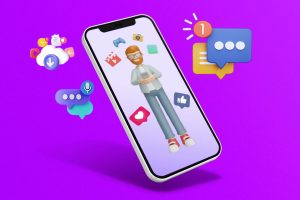The way people connect, communicate, and trade information has radically changed as a result of social media. Over the past ten years, there has been a swift development of digital platforms, resulting in the creation of an instantaneous global user network. Numerous facets of society, such as commerce, politics, culture, and communication, have been touched by this phenomenon.
The development of user profiles is one of the characteristics that sets social media apart. By sharing personal details like their name, location, and interests, people can create an online profile. This virtual identity serves as the user’s representation in the virtual environment, providing more information about them to others. Individuals frequently add a profile photo to their online persona, giving it a visual element.
The fundamental function of social media platforms is content sharing. Content can be posted by users in a variety of formats, including text updates, photos, videos, and links. Sharing multimedia content allows people to express themselves in a variety of ways. Users may customize their postings to fit their hobbies and tastes, whether it’s an amusing video, an insightful article, or a fascinating photo.

Social media is fundamentally about connections and networks. Users can establish connections with strangers as well as friends, family, and coworkers to create a network of contacts. By allowing users to view and engage with other people’s content, these links promote a sense of community. Platforms differ in terms of these networks’ size and makeup; some prioritize professional networking (like LinkedIn), while others, like Facebook, concentrate more on fostering personal relationships.
Engagement and interaction are key elements of the social media experience. By liking, commenting, sharing, or responding to postings, users can interact with the content. This interactive aspect facilitates communication and the exchange of ideas. It also allows users to express their opinions, provide feedback, or support others within the virtual community. Social media platforms often incorporate algorithms that prioritize content based on user engagement, promoting popular or relevant posts to a broader audience.

The significance of privacy settings has increased along with the growth in social media usage. A lot of platforms let users adjust their privacy settings, giving them the ability to manage who may connect with them, read their profile, and engage with their material. Users can control their online identity and protect their personal data with the use of these options. Nonetheless, discussions over data security, information sharing, and the moral ramifications of user tracking continue to raise privacy concerns.
The digital world is dominated by a number of social media networks as of January 2024, when I last updated my understanding. Facebook is still the most popular social media site due to its large user base. Instagram attracts users who post and explore photographs and videos, making it stand out for its visual content. Twitter has become the go-to source for news, trends, and public conversation because of its succinct and real-time structure. LinkedIn serves professionals looking to advance their careers and network.
YouTube has emerged as the leading video-sharing platform, allowing users to upload and watch a vast array of videos. Snapchat, known for its ephemeral content, provides a unique messaging experience. TikTok, a relatively new entrant, has gained immense popularity with its short-form, creative videos. Pinterest appeals to those seeking inspiration and ideas through image-based content.
Even with all of social media’s benefits, problems and worries still exist. There is constant discussion about privacy concerns, misinformation, cyberbullying, and the effects of social media on mental health. Users are urged to take caution, be aware of how they behave online, and keep themselves updated about the possible risks related to using social media.

In conclusion, social media has revolutionized communication and information sharing, making it a vital part of modern society. Beyond interpersonal relationships, it has an impact on politics, business, and culture. Even though social media has many advantages, users must use these tools responsibly, taking into account any potential drawbacks as well as moral dilemmas unique to the digital age. Social media’s influence on how people connect with one another and the dynamics of society will surely change much more as technology advances.








0 Comments